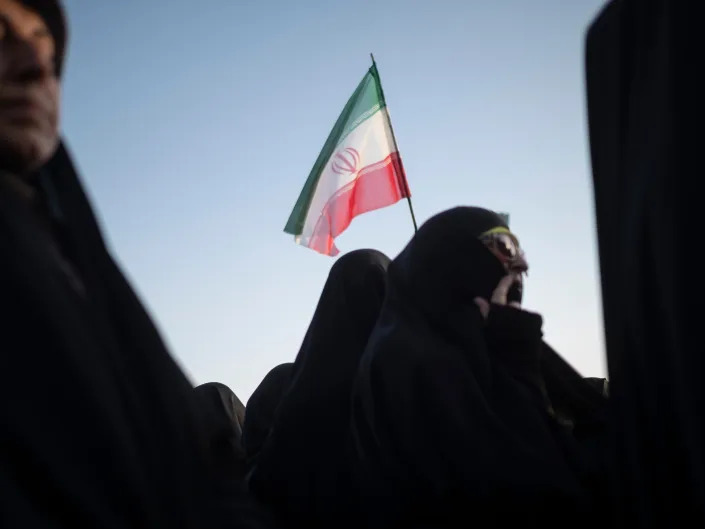Joshua Zitser
Updated Mon, July 24, 2023

Women stand under an Iranian flag during a rally in support of the hijab on July 12, 2023.
Morteza Nikoubazl/NurPhoto via Getty Images
Iranian judges diagnosed three female actors with mental illnesses after they refused to wear hijabs, per reports.
They must attend psychiatric centers for treatment as part of their court sentencing, per RFE/RL.
The ruling caused outrage among psychiatrists, who wrote an open letter criticizing the move.
Judges in Iran have handed down diagnoses of mental illnesses to three famous Iranian female actors for refusing to wear hijabs, RadioFranceEurope/Radio Liberty (RFE/RL) reported.
Azadeh Samadi, Leila Bolukat, and Afsaneh Bayegan recently appeared in public without headscarves, a violation of Iran's strict rules on modesty.
Women who refuse to wear a hijab in public in Iran can face up to two years in prison, though repeat offenders can expect to spend more time behind bars if proposed legislation passes.
Bayegan, a veteran actor who wore a hat instead of a hijab to a film ceremony, was handed a two-year prison sentence, as well as a ban on travel and using the Internet, on July 19.
She was also ordered to undergo mandatory psychological treatment for what was described by judges as an "anti-family personality disorder" — a condition that is not recognized by any major Western medical bodies, per RFE/RL.
Samadi, 44, was given a similar medical order.
Tehran's Criminal Court ordered on July 18 that she must visit psychiatric centers every two weeks to be treated for an "anti-social disease," RFE/RL reported, citing Iranian media.
Samadi was detained after wearing a hat instead of a hijab at a funeral. Though she was not given prison time, she was denied access to her phone for six months and had all of her social media accounts shut down.
Bolukat, 42, who was previously handed a sentence of six months in prison, with a further ban on professional activities for two years, was also diagnosed by judges with a mental illness, per RFE/RL.
Her punishment comes after she posted images of herself without a hijab on social media, the news outlet reported.
Iran's strict hijab laws have inspired major protests over the past year, sparked by the death of 22-year-old Mahsa Amini last September.
Iran's major psychiatric bodies pushed back on this latest move, with the heads of four psychiatry boards going public with their criticism in an open letter to Iran's judiciary chief, RFE/RL reported.
"The diagnosis of mental disorders is within the competence of a psychiatrist, not a judge," the letter said, per the news outlet. "Just as the diagnosis of other diseases is in the competence of doctors, not judges."
Calling the diagnoses "unscientific and strange," the open letter demanded that authorities amend the sentences against the three women, according to RFE/RL.
Iranian judges diagnosed three female actors with mental illnesses after they refused to wear hijabs, per reports.
They must attend psychiatric centers for treatment as part of their court sentencing, per RFE/RL.
The ruling caused outrage among psychiatrists, who wrote an open letter criticizing the move.
Judges in Iran have handed down diagnoses of mental illnesses to three famous Iranian female actors for refusing to wear hijabs, RadioFranceEurope/Radio Liberty (RFE/RL) reported.
Azadeh Samadi, Leila Bolukat, and Afsaneh Bayegan recently appeared in public without headscarves, a violation of Iran's strict rules on modesty.
Women who refuse to wear a hijab in public in Iran can face up to two years in prison, though repeat offenders can expect to spend more time behind bars if proposed legislation passes.
Bayegan, a veteran actor who wore a hat instead of a hijab to a film ceremony, was handed a two-year prison sentence, as well as a ban on travel and using the Internet, on July 19.
She was also ordered to undergo mandatory psychological treatment for what was described by judges as an "anti-family personality disorder" — a condition that is not recognized by any major Western medical bodies, per RFE/RL.
Samadi, 44, was given a similar medical order.
Tehran's Criminal Court ordered on July 18 that she must visit psychiatric centers every two weeks to be treated for an "anti-social disease," RFE/RL reported, citing Iranian media.
Samadi was detained after wearing a hat instead of a hijab at a funeral. Though she was not given prison time, she was denied access to her phone for six months and had all of her social media accounts shut down.
Bolukat, 42, who was previously handed a sentence of six months in prison, with a further ban on professional activities for two years, was also diagnosed by judges with a mental illness, per RFE/RL.
Her punishment comes after she posted images of herself without a hijab on social media, the news outlet reported.
Iran's strict hijab laws have inspired major protests over the past year, sparked by the death of 22-year-old Mahsa Amini last September.
Iran's major psychiatric bodies pushed back on this latest move, with the heads of four psychiatry boards going public with their criticism in an open letter to Iran's judiciary chief, RFE/RL reported.
"The diagnosis of mental disorders is within the competence of a psychiatrist, not a judge," the letter said, per the news outlet. "Just as the diagnosis of other diseases is in the competence of doctors, not judges."
Calling the diagnoses "unscientific and strange," the open letter demanded that authorities amend the sentences against the three women, according to RFE/RL.
No comments:
Post a Comment